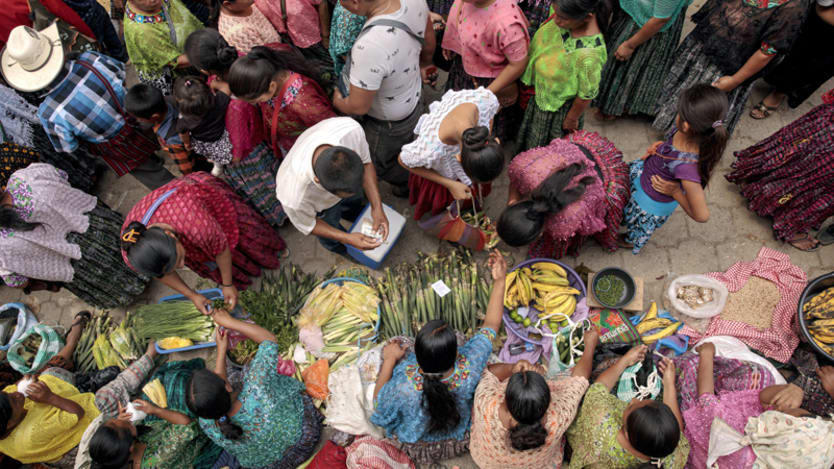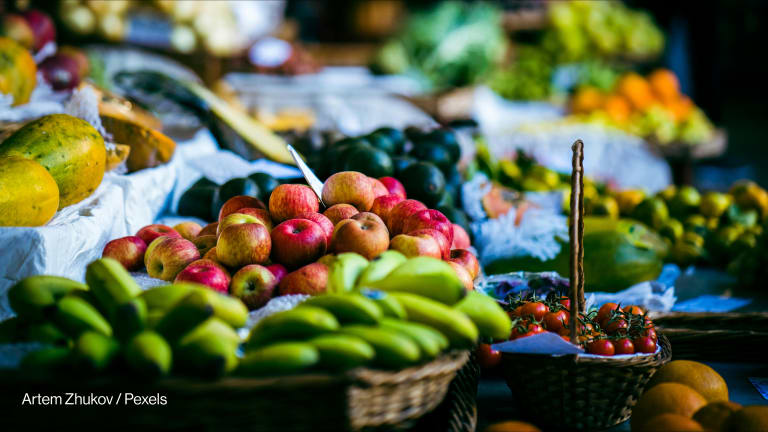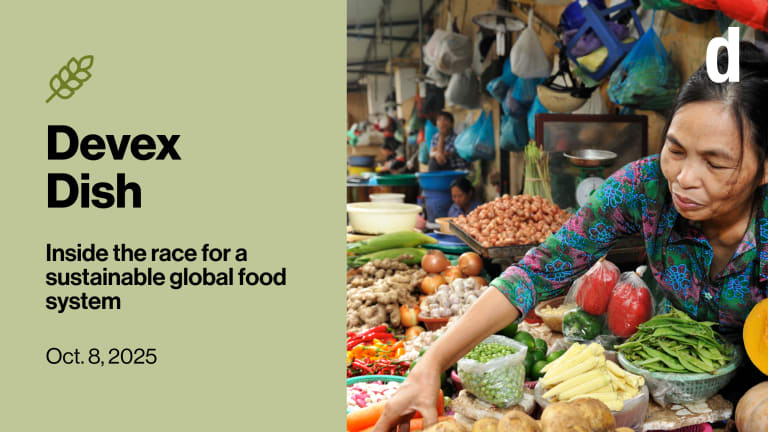
BERLIN — Scientists have charted an ambitious new plan to transform the global food system by 2050 with the twin goals of making it sustainable while delivering healthy diets to everyone in the world. To succeed, the development community will need to join governments, businesses, and consumers in translating the plan into reality.
Though the role of development actors goes largely unaddressed in the report from the EAT-Lancet Commission — a joint project of the food system-focused nonprofit and the medical journal — theirs will be critical to translating the panel's framework into granular actions. Ensuring the fragile and conflict-affected communities already suffering from chronic undernutrition are not left behind is one area, in particular, that will require development expertise.
"In the current context of rising numbers of chronically hungry, the increasing impacts of climate change, we have to look at addressing both acute crises and the fundamental change needed in food systems over the long term."
— Tonya Rawe, global policy lead for food and nutrition, CARE InternationalThe report, published in The Lancet in this month, drew together 37 experts from 16 countries to consider whether it was possible to construct a diet derived from an environmentally sustainable food system that could simultaneously keep the projected 10 billion people living on earth in 2050 healthy.
What they arrived at is a reference diet that is rich in fruits, vegetables, and plant-based proteins and that limits animal proteins. It would require more than a 50 percent global reduction in consumption of foods the researchers described as unhealthy, such as red meat and sugar, by 2050 and a 100 percent increase in consumption of healthier alternatives, including fruits, nuts, vegetables, and legumes.
A global shift to this diet would reorient food production in a way that, in combination with improved agricultural practices to get more out of land already under cultivation and a reduction in food waste, "we can actually take ourselves back to a sustainable future for humanity on earth," the report's co-author Johan Rockström said at the launch. The commissioners also called for the adoption of land management practices that would transform agriculture from a source of carbon into a sink.
"That is the stark contrast between where we are now and where we need to be," said Asma Lateef, director of Bread for the World Institute, which provides policy analysis on ending hunger. "I didn't expect it to be that dramatic. It's a complete shift."
To make this happen, the panel called on governments to consider the policy measures, including taxes and food labelling requirements, that might be necessary to guide this transformation. They looked to industries to reconsider what they are selling and to restrict advertising for foods that are unhealthy. And they noted that consumers, guided by public campaigns, would need to change their diets.
They stopped short, though, of prescribing a definitive way forward. That is where the development sector comes in: "We look at what it is we're doing that we can build further on," Anushree Rao, a senior policy officer in nutrition at Concern Worldwide, told Devex. "It's about contextualizing some of the recommendations of the report."
This is very much what its authors intended. The commissioners explained that their goal was to provide a universal framework "with a high potential of local adaptation and scalability."
Tonya Rawe, CARE International's global policy lead for food and nutrition, pointed to opportunities to think about how agencies might integrate some of the recommendations into the work they are already doing to shift agricultural systems in response to climate change. There might also be opportunities to work with communities to diversify their diets — including the recommendation to move away from the starchy vegetables that are often the easiest food to come by in developing areas.
Because that work will require being rooted in the community over the long term, NGOs may be best positioned to experiment with how to introduce and set up technically difficult processes recommended in the report. And in considering how those recommendations might be implemented, the development agencies can help flesh out the local implications of what is currently a broad strategy. That means addressing the clashes with cultural traditions and small-scale dietary preferences that are bound to arise in any attempt to dramatically overhaul both diets and food systems.
"If we don't have evidence, it can't inform policy change, cannot inform investments, programmatic changes," Rao said. "In the broad sense, we definitely welcome such evidence. How we choose to implement has to do with the feasibility and practicality of the contexts we're working in. What it is we're already doing that we can build further on."
That balance is most evident in fragile or conflict-affected scenarios, where the immediate need is to ensure people have enough to eat and there is limited opportunity to build durable food systems. The report emerges against a backdrop of rising global hunger — nearly 821 million people faced chronic food deprivation in 2017, according to the Food and Agriculture Organization, up from 804 million the year before. The causes can be traced to persistent instability, climate events, and economic slowdowns.
Nevertheless, achieving the vision laid out by the EAT-Lancet Commission means ensuring everyone, including the people facing those challenges, are not only provided for but also have access to the reference diet. The commissioners recognized that tension, even as they acknowledged that it went beyond their mandate. Now, there is an opportunity for the development community to guide thinking about how to wed long-term sustainability to an emergency response and how to drive toward solutions by positioning food security within broader social and political dynamics.
"In the current context of rising numbers of chronically hungry, the increasing impacts of climate change, we have to look at addressing both acute crises and the fundamental change needed in food systems over the long term," Rawe said.
Development experts were not expecting the EAT-Lancet Commission to provide all of the answers, but they are happy the commissioners are emphasizing that different sectors will need to be involved in finding those answers while underscoring the importance of doing so quickly. Alongside the report's release, the commission warned in a statement that: "Delaying action will only increase the likelihood of serious, even disastrous, consequences."
"It will take a bridging of various communities to really move this agenda forward," Lateef said. "Having the evidence base behind what is climate-smart in terms of food systems and agricultural and nutrition investments is really helpful in being able to connect the dots with some of the drivers of hunger."
And the commission's urgency boosts another aspect of the work NGOs and civil society groups are doing: pushing for policy and financial commitments to build sustainable food systems that account for both climate change and health. Lateef pointed to the opportunity to work with the U.S. Agency for International Development's Feed the Future initiative, which helps guide food system changes, to set up systems and strategies that reflect the diet recommended by the report.
"I'm hopeful this is a start to bridging some of the gaps and really bringing new players and energy to issues that are interconnected and integrated," she said.








